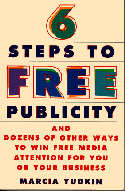
Step Five: Talk Effectively With Reporters
Occasionally a magazine or newspaper will print your
press release word for word. Other times they excerpt it or
restate your information in their own style. More often,
they call the contact number you provided to get additional
quotes and details in order to write an article tailor made
for their audience.
It's possible for you to blow the opportunity when a
reporter calls. Follow these guidelines to maximize your
chances of ending up in the story.
- Call the reporter back as soon as possible. Even more
important, call him or her back, period! In researching my
two most recent books, I was astounded at the number of
businesspeople who didn't seem to understand what being
mentioned in a book could do for them. Usually if I left two
messages and they didn't call back, I crossed them off my
list.
- If the reporter catches you in, however, you don't need
to do the interview on the spot. It's reasonable to ask about
the focus and scope of the story and set up another time to
talk, so you can be thinking in the meanwhile about what to
tell him or her.
- Know your agenda. Decide ahead of time what you most
want to communicate and prepare your "talking points." Think
also about any topics it might not be in your best interest
to discuss. Either steer conversation away from them or
politely end the interview if it turns out those are the
reporter's primary interest.
- Be specific, anecdotal and colorful during the interview.
The more quotable your remarks, the more likely you'll be
quoted at length. Instead of "very profitable," say, "it
took three hours every morning to count the checks." Instead
of "I love it in New England," talk about how you enjoy the
changing of the seasons and respect the neighbor who is
rebuilding the stone wall between your property and his.
- Spell out names and explain any unusual terms you use.
Even better, fax or send fact sheets or a bio for the
reporter to use as reference. People often complain about
reporters making mistakes, but you can prevent them by
putting the appropriate facts literally in front of them.
- Don't ask to approve the story before it's published. At
most, a responsible reporter may agree to read back to you
portions of the article in which you're quoted to make sure
it's accurate. And if mistakes or distortions do turn up in
the story, thank the reporter anyway. Chances are the
article will benefit you even with half a dozen bungles.
[Home]
Copyright © 1994 Marcia Yudkin. All rights reserved.




